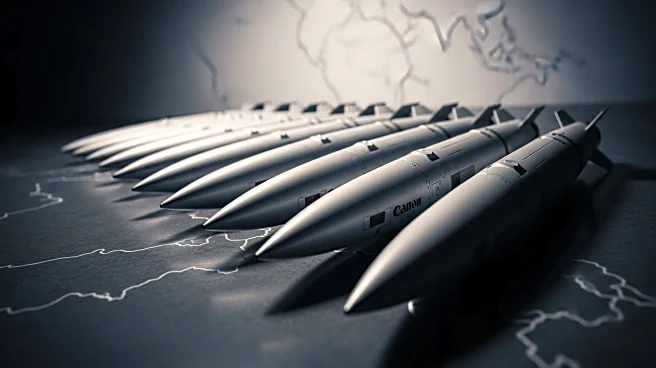What's Happening?
President Trump is reportedly close to deciding on supplying Ukraine with long-range Tomahawk cruise missiles. This decision is influenced by recent Russian attacks on Ukraine's power grid, which have intensified the humanitarian crisis in the region. The move aims to bolster Ukraine's defense capabilities and pressure European allies, particularly Germany, to provide similar support. German Chancellor Friedrich Merz has announced plans to discuss joint efforts with Trump to end the war in Ukraine. Ukrainian President Volodymyr Zelensky is scheduled to visit Washington to secure crucial defense capabilities, including air defense and long-range capabilities. The potential delivery of Tomahawk missiles marks a significant shift in U.S. policy, reflecting Trump's frustration with Russia's refusal to engage in peace talks.
Why It's Important?
The decision to supply Tomahawk missiles to Ukraine could significantly impact U.S. foreign policy and defense strategy. It represents a strategic escalation aimed at pressuring Russia and hesitant European allies. The move could alter the balance of power in the region, potentially affecting Russia's ability to wage war. It also highlights the growing humanitarian crisis in Ukraine, as Russian attacks target critical infrastructure, threatening millions of civilians with power and heat shortages as winter approaches. The U.S. action could lead to increased diplomatic pressure on Germany and other European nations to provide military support to Ukraine, potentially reshaping alliances and defense strategies in Europe.
What's Next?
Ukrainian President Zelensky's upcoming visit to Washington is expected to focus on securing defense capabilities and exploring strategic defense cooperation with the U.S. The visit may also involve discussions on integrating Ukraine's military efforts into broader U.S. security strategies, such as the 'Golden Dome for America' missile defense initiative. The potential supply of Tomahawk missiles could lead to increased diplomatic and military pressure on Russia, possibly affecting its strategic decisions. European allies, particularly Germany, may face heightened pressure to provide military support to Ukraine, potentially leading to shifts in European defense policies.
Beyond the Headlines
The potential supply of Tomahawk missiles to Ukraine raises ethical and strategic questions about the escalation of military aid in conflict zones. It underscores the complexity of international diplomacy and the challenges of balancing humanitarian concerns with strategic military objectives. The move could trigger long-term shifts in U.S. defense policy, emphasizing the integration of foreign military struggles into domestic security strategies. It also highlights the role of military aid in shaping geopolitical alliances and influencing the outcomes of international conflicts.









